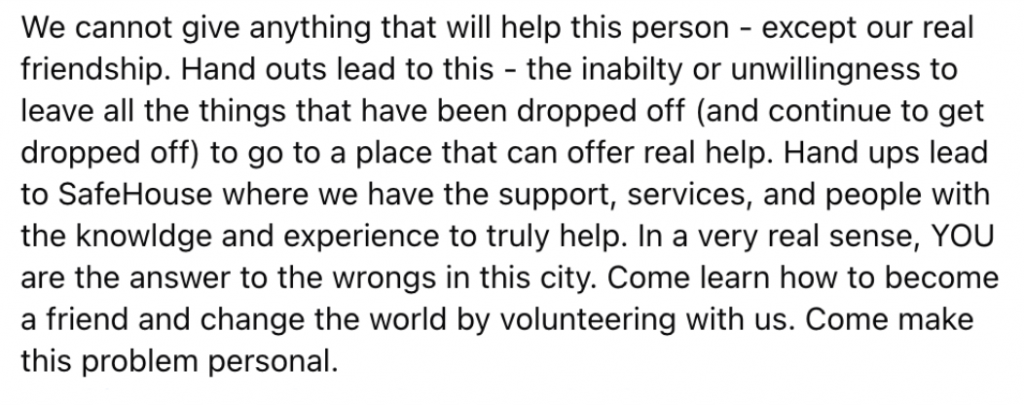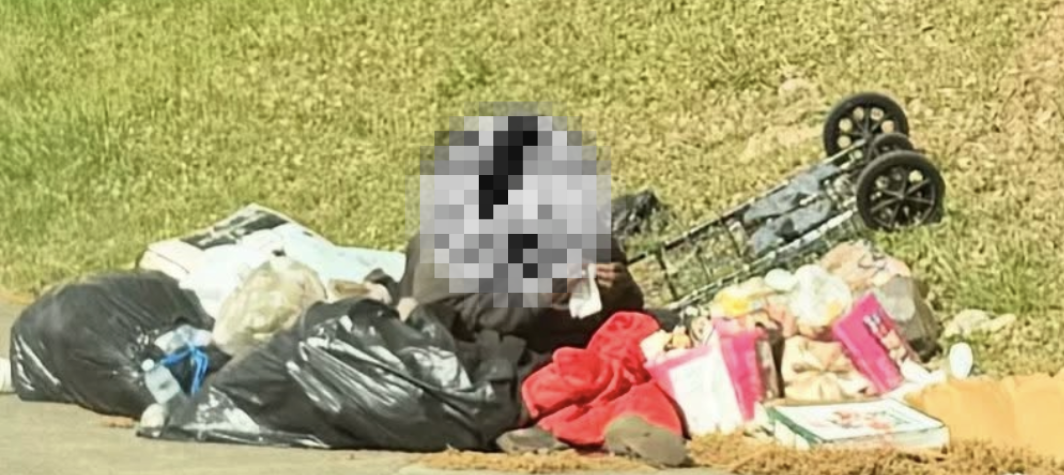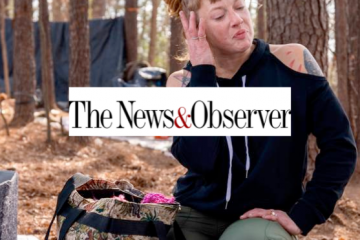Hey helpers,
A few days ago, an outreach organization shared this image (without the blur) to social media and it raised my blood pressure. They didn’t ask this person’s permission to take, much less share this photo. I know this for a fact because I know this person personally. Anyone in the area knows who and generally where they are. By sharing this photo, this organization violated consent and stole this individual’s autonomy for their own gain.
What did they have to gain? They were trying to recruit volunteers. Here’s the caption they included with the photo:

Where do I start? I guess I’ll dissect it line by line.
We cannot give anything that will help this person…
Frankly, that should have been the end of the sentence, because the individual who wrote the post is not showing any evidence that their “true friendship” is worth anything.
Hand outs lead to this – the inabilty [sic] or unwillingness to leave all the things that have been dropped off (and continue to get dropped off) to go to a place that can offer real help.
Three problems in one sentence, starting with the opening phrase. “Hand outs lead to this” is stigmatizing, problematic, and harmful messaging to have come from a homeless services organization. Their followers might read that sentence and stop keeping snacks or bottles of water in their car to share with people in need. They may stop donating to those who provide those basic needs to people experiencing homelessness every day, like I do.
The second problem is that they don’t know the individual. I do. I know what the person is up against, and I know that everything in that sentence is a broad statement that in no way applies to this person, but because they are homeless, the writer felt empowered to say it as though it did.
Finally, they say “go to a place that can offer real help.” Whew, let me take a breath. Whether it was their intent or not (and I don’t think it was), that statement is a slap in the face to every individual and organization who has offered this person assistance, including me. If they’d like to know about a place that can offer real help though, they’re invited to stop by my office. The place from which I have housed nearly 18 people in the last 17 months, helped several more cure their Hep C and get treatment for their HIV. Or the more than two dozen people who are now working on their recovery from addiction in my office.
Hand ups lead to [organization] where we have the support, services, and people with the knowldge [sic] and experience to truly help.
Again with the condescension as though they have the only real answers. Miss me with that mess.
Come learn how to become a friend and change the world by volunteering with us. Come make this problem personal.
So the only way to truly solve the issues surrounding homelessness is to learn from their (faith-led) organization. I love that last sentence, especially since this has been my personal problem for over a decade and a half in Atlanta alone. I don’t need to follow their extremely problematic lead, thanks.
So here’s where I wrap up and tell you how you can help. For starters, you can give Episode 3 of the podcast a listen. Maybe after this blog post, you’ll understand better why I called it – and my outreach guide – How to Treat People Like People.
If you see someone who needs clothes and it is within your means, help them.
If someone tells you they are hungry and it is within your means, help them.
If someone tells you they are thirsty and it is within your means, help them.
It boggles my mind that a leader at a faith-based and faith-led organization would say any of those things, but they did. I don’t have to be a Christian to do the right thing, and I seem to remember that Jesus said:
“For I was hungry and you gave me something to eat, I was thirsty and you gave me something to drink, I was a stranger and you invited me in, I needed clothes and you clothed me, I was sick and you looked after me, I was in prison and you came to visit me.” Matthew 25: 35-36
Finally, please continue to support the people and organizations who are doing street-based outreach work. We are working miracles with very little every day, and though funding is always a concern, everything happening in this country right now is making it even harder to help.
Yours in compassion,







Thank you!